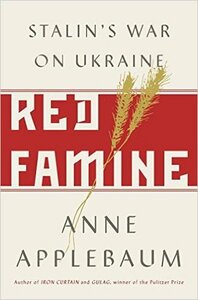Take a photo of a barcode or cover
informative
slow-paced
challenging
dark
emotional
informative
sad
medium-paced
dark
informative
slow-paced
challenging
dark
emotional
informative
reflective
sad
medium-paced
Very relevant in understanding the context of the current iteration of the Ukrainian/Russian conflict.
Anne Applebaum won a Pulitzer for Gulag, but she could have earned one for Red Famine too. This book is the comprehensive story of famine in Ukraine under Soviet rule. It is especially thorough in covering the second famine of 1932-33. Millions of people died, and Applebaum's research tells the story of their hardships, how it happened, and the consequences that would impact Ukraine for the next century..
challenging
dark
informative
reflective
medium-paced
It is hard to think of necessarily anything wrong with this book, especially given its ability to turn an event I had only known partially about, and by no means to any considerable detail, into a fully fleshed out depiction complete with context and explanation.
This book does exactly what I like in building up an events so that there can be a concrete understanding made in terms of what led to what, why it did so, and how said events can be viewed in the framework of a larger period. Whether it was the prior events of the USSR to erase the Ukrainian identity, then attempt to encourage it in order to appease nationalist movements, up until the point of finally growing tired enough so as to forcefully starve an entire part of their empire to death, I was given not only a far more complete understanding of Holodomor, but so too the struggle for life for Ukraine since the fall of the Russian Empire up until the fall of the Soviet Empire.
While the book is somewhat sensationalist at times, especially in going into the grizzly details of reality during Holodomor, I do see the necessity in reminding audiences of this horror, especially as it is lost in the fog of many other genocides during this era such as in Armenia and the Holocaust.
However, in spite of this, the book is honestly very good at admitting in shortcomings, and even acknowledging certain unsavory aspects of this time period such as the cooperation of Ukrainian nationalist organizations with the German Reich at the onset of the invasion, even though this would later become partisan activity within their borders as the signs of prolonged German occupation became apparent. This book is good especially in bringing up the nature of the controversy around calling the deliberate starvation of between 3 to 10 million Ukrainians a 'genocide.' Written before the full-scale invasion of Ukraine by Russia, the book still does talk a good deal about the Russian Federation's efforts to downplay the genocide if not even, at times, deny its existence, consistent with the policies of their predecessor state.
Overall, very good and informative book. 4.5/5
This book does exactly what I like in building up an events so that there can be a concrete understanding made in terms of what led to what, why it did so, and how said events can be viewed in the framework of a larger period. Whether it was the prior events of the USSR to erase the Ukrainian identity, then attempt to encourage it in order to appease nationalist movements, up until the point of finally growing tired enough so as to forcefully starve an entire part of their empire to death, I was given not only a far more complete understanding of Holodomor, but so too the struggle for life for Ukraine since the fall of the Russian Empire up until the fall of the Soviet Empire.
While the book is somewhat sensationalist at times, especially in going into the grizzly details of reality during Holodomor, I do see the necessity in reminding audiences of this horror, especially as it is lost in the fog of many other genocides during this era such as in Armenia and the Holocaust.
However, in spite of this, the book is honestly very good at admitting in shortcomings, and even acknowledging certain unsavory aspects of this time period such as the cooperation of Ukrainian nationalist organizations with the German Reich at the onset of the invasion, even though this would later become partisan activity within their borders as the signs of prolonged German occupation became apparent. This book is good especially in bringing up the nature of the controversy around calling the deliberate starvation of between 3 to 10 million Ukrainians a 'genocide.' Written before the full-scale invasion of Ukraine by Russia, the book still does talk a good deal about the Russian Federation's efforts to downplay the genocide if not even, at times, deny its existence, consistent with the policies of their predecessor state.
Overall, very good and informative book. 4.5/5
challenging
dark
informative
slow-paced
dark
informative
medium-paced
challenging
dark
informative
reflective
sad
slow-paced




